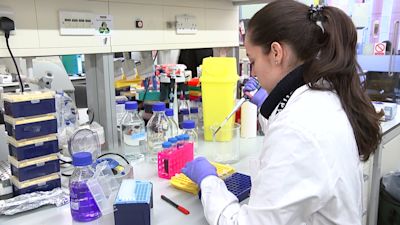Peterborough in trial of blood test to detect more than 50 forms of cancer before symptoms appear

Thousands of people in Peterborough will be invited to help the NHS trial a pioneering new blood test that can detect more than 50 types of cancer before symptoms appear.
The city has been selected as one of several places across the country to take part in the world's largest trial of the revolutionary new test.
People aged 50-77 are being asked to look out for a letter from the NHS over the coming weeks inviting them to volunteer for the trial.
Participants must not have had a cancer diagnosis or treatment in the last three years.
They will have a small blood sample taken at a mobile clinic in Peterborough Town Cricket Club in Dalrod Sports Ground from 9 November to 10 December.
They will be invited back after 12 months, and again at two years, to give further blood samples.
The potentially lifesaving Galleri test checks for the earliest signs of cancer in the blood and the NHS-Galleri trial - the first of its kind - aims to recruit 140,000 volunteers nationally, including thousands in Peterborough, to see how well the test works in the NHS.
The trial team are inviting people from a wide range of backgrounds and ethnicities to ensure results are relevant for as many different people as possible.
Dr Stuti Mukherjee, Macmillan GP & GP Clinical Lead, Cancer, Cambridgeshire & Peterborough CCG, said:
The East of England Cancer Alliance is helping to ensure that participants who test positive in this region get the necessary follow-up appointments.
Clinical Director for the East of England North Cancer Alliance, Dr Linda Hunter, said: "If you receive a letter please consider booking an appointment as soon as you can while the clinic is based in Peterborough."
The test is a simple blood test that research has shown is particularly effective at finding cancers that are difficult to identify early - such as head and neck, bowel, lung, pancreatic, and throat cancers.
It works by finding chemical changes in fragments of genetic code - cell-free DNA (cfDNA) - that leak from tumours into the bloodstream.
The mobile clinic will move on to other locations in the east of England following its time in Peterborough.
The NHS-Galleri trial is being run by The Cancer Research UK and King's College London Cancer Prevention Trials Unit in partnership with NHS England and healthcare company, GRAIL, which has developed the Galleri test.
All participants will be advised to continue with their standard NHS screening appointments and to still contact their GP if they notice any new or unusual symptoms.
Sir Harpal Kumar, President of GRAIL Europe, said: "We're delighted to partner with the NHS to support the NHS Long Term Plan for earlier cancer diagnosis, and we are eager to bring our technology to people in the UK as quickly as we can. The Galleri test can not only detect a wide range of cancer types but can also predict where the cancer is in the body with a high degree of accuracy. The test is particularly strong at detecting deadly cancers and has a very low rate of false positives."
Initial results of the study are expected by 2023 and, if successful, NHS England plans to extend the rollout to a further one million people in 2024 and 2025.
Patients whose condition is diagnosed at 'stage one' typically have between five and 10 times the chance of surviving compared with those found at 'stage four'.